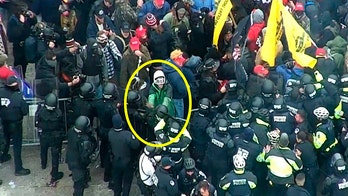Battling toe-to-toe for the first time, Mitt Romney leap-frogged President Obama in dueling economic speeches Thursday to Ohio voters, and ripped his opponent's record on jobs growth and an American economy stuck in neutral.
The president, countering in an economic address of his own moments later, claimed that Romney's economic prescriptions would signal a return to policies that set the stage for the 2008 financial crisis and subsequent recession. He alleged Romney's policies would mirror those of the George W. Bush administration.
The two speeches in one of the most critical of battleground states -- with Romney speaking from Cincinnati, and Obama from Cleveland -- marked the closest thing yet to a general election debate. Each candidate described the other as disastrous for the country's economic future.
In Cincinnati, Romney preempted the president after initially being scheduled to begin his speech a few minutes after Obama. Instead, Romney started early -- getting the jump on the president's speech to offer his own rebuttal in advance.
Romney said Obama was delivering the economic address "because he hasn't delivered a recovery for the economy."
"He's going to be a person of eloquence as he describes his plans for making the economy better, but don't forget -- he's been president for three and a half years, and talk is cheap. Action speaks very loud," he said.
Romney accused Obama of pushing policies that are bad for business. "Let's go through them one by one," he said. "Failed stimulus; ObamaCare resulted in fewer hires; Dodd-Frank hurt banks' ability to lend, especially to small businesses; failed energy policy."
Romney outlined a three-point plan for what he'd do first if elected -- improve domestic energy production, get rid of the health care overhaul and reduce the deficit.
Obama, in a lengthy address that lasted nearly an hour, spoke to his goals for a second term in broad strokes. He did not offer new jobs proposals, but stressed what he described as fundamental differences between his vision and that of the Republicans.
Obama accused Romney and congressional Republicans of pushing plans for less regulation and lower taxes for the wealthy that would repeat what he effectively described as a failed experiment during the Bush administration.
"It would push us deeper into recession and make the recovery slower," Obama said. "We've tried this. ... Their policies did not grow the economy.
"Why would we think that they would work better this time?" he asked.
Obama said he wants to devote a second term to improving education, clean energy and infrastructure and reforming the tax code in a "balanced" way. He tried to shed the image of a big-government Democrat, saying he's determined to address the deficit -- and does not believe more regulation is the answer to America's problems.
The president is trying to recover from a raft of bad economic news and campaign setbacks, and try to lift his campaign above the day-to-day controversies to outline the thematic differences between his vision and his opponent's. He's been under steady attack in recent days by Republicans for slipping and saying the private sector's "doing fine" during a press conference -- Obama made reference to that comment Thursday.
"Over the next five months, this election will take many twists and many turns, polls will go up and polls will go down. There will be no shortage of gaffes and controversies that keep both campaigns busy and give the press something to write about," he said. "You may have heard recently I made my own unique contribution to that process."
Romney tweaked Obama again on his gaffe Thursday, releasing a TV ad highlighting it and saying during his address: "If you think the private sector is doing fine, then he's the guy to vote for."
Romney also criticized Obama's domestic energy policy, saying he made it harder to drill for coal, wrongly curtailed offshore drilling and failed to approve the Keystone XL oil pipeline. "You don't even need to ask people about that one," Romney said before a crowd of roughly 200 at the rally at Seilkop Industries. "If I have to build it myself, I'll get that oil in from Canada to America."





